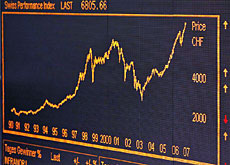Swiss business riding crest of a wave

Swiss companies enjoyed a bumper year of profits in 2006 that fuelled a record high on the stock exchange and a highly anticipated end of year bonus bonanza.
But economists have warned firms to brace for the effects of a temporary global slowdown next year and the early signs are already visible in Switzerland.
Buoyed by the strong momentum in evidence during the latter stages of 2005, the two main Swiss banks, UBS and Credit Suisse, turned in impressive first-half results. Net profits leapt 68 per cent at Credit Suisse, which sold its insurance arm Winterthur, and by 40 per cent at UBS.
However, the banking industry’s reputation took a battering as details of suspicious trading activity during last year’s merger of Swissfirst and Bellevue banks became public.
Criminal prosecutors are currently investigating why some pension funds sold Swissfirst stock just prior to the deal, thereby depriving themselves of substantial gains. Swissfirst chief executive Thomas Matter resigned from his post in August amid allegations of illegal insider trading.
The pharmaceutical and biotechnology sector, led by Roche and Novartis, in general also posted healthy profits. One struggling firm, Serono, appears to have dug itself out of trouble by selling up to German drug maker Merck, while prospering vaccine producer Berna Biotech agreed to a takeover from Dutch firm Crucell early this year.
Analysts predict further takeover activity in the mid-sized biotechnology industry in the coming months and years.
Strong exports
The insurance sector showed signs it was weathering the effects of last year’s catastrophic storm damage.
Swiss Re shrugged off a storm-related profit hit by buying the reinsurance arm of General Electric, in a deal costing more than SFr11 billion ($9 billion), to become the world’s largest re-insurer. Converium continued along the path to recovery after returning to profit in 2005.
Strong exports boosted the manufacturing sector with the once troubled engineering group ABB completing its turnaround from virtual ruin five years ago with a return to robust growth.
Switzerland’s other home-grown giant, Nestlé, increased its voracious appetite by gobbling up Novartis’s Medical Nutrition business for just over SFr3. billion and United States diet firm Jenny Craig.
More than half of small and medium-sized enterprises registered higher sales in the third quarter of 2006 compared to the previous three months, according to a new barometer measuring SME health launched by UBS.
The surge in profits pushed the Swiss Market Index to a record high of 8,836 points in November, bettering the previous 8,312 set during the dotcom bubble days eight years ago. The SMI ended the year at 8,786 points, 16 per cent higher that at the end of 2005.
Brakes applied
The fast pace of economic growth prompted the Swiss National Bank (SNB) to raise interest rates by 25 basis points for the fifth consecutive time in December to set raise its benchmark target rate to two per cent. The SNB also predicts two further such rises next year.
However, even this measure has failed to convince economists that the Swiss economy can carry on at such a pace for much longer. The general consensus is that Switzerland will feel the effects of a cooling in the US economy next year, but that slowdown will result in a soft landing.
A range of leading economic indicators predicts a growth in gross domestic product of between 2.6 and three per cent this year, followed by between 1.7 and 2.2 per cent in 2007.
Possible signs of this deceleration showed up in an unexpectedly sharp slowdown in the Swiss economy in the third quarter. UBS profits between June and September also plunged 22 per cent from the corresponding period of last year.
But the picture is not by any means grim. In a survey conducted by the weekly business newspaper Handelszeitung, many top firms are planning to recruit more employees in 2007 and the State Secretariat for Economic Affairs (Seco) predicts unemployment to drop from the current 3.1 per cent to 2.8 per cent next year.
swissinfo, Matthew Allen
OECD forecasts for country GDP growth rates:
Switzerland: 3% (2006), 2.2% (2007), 2% (2008)
Eurozone: 2.6% (2006), 2.2% (2007), 2.3% (2008)
United States: 3.3% (2006), 2.4% (2007), 2.7% (2008)
Japan: 2.8% (2006), 2.0% (2007), 2.0% (2008)
According to Seco figures, Switzerland’s third quarter GDP expanded by 0.4% compared with the second quarter. On a year-on-year basis, GDP grew by 2.4%, falling short of expectations of 2.9%.
However, consumer sentiment was high in the build-up to the Christmas shopping period. The Seco consumer sentiment index rose to +13 points in October compared with +12 points in July. At the end of last year the index was –15 points.
The annual Credit Suisse survey on Swiss worries showed that joblessness tops the bill of concerns for the fourth year running.

In compliance with the JTI standards
More: SWI swissinfo.ch certified by the Journalism Trust Initiative

You can find an overview of ongoing debates with our journalists here. Please join us!
If you want to start a conversation about a topic raised in this article or want to report factual errors, email us at english@swissinfo.ch.